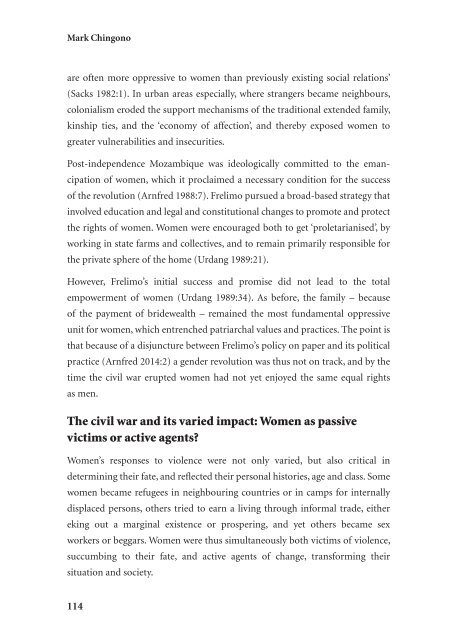ACCORD-ajcr-2015-1
ACCORD-ajcr-2015-1
ACCORD-ajcr-2015-1
- No tags were found...
Create successful ePaper yourself
Turn your PDF publications into a flip-book with our unique Google optimized e-Paper software.
Mark Chingono<br />
are often more oppressive to women than previously existing social relations’<br />
(Sacks 1982:1). In urban areas especially, where strangers became neighbours,<br />
colonialism eroded the support mechanisms of the traditional extended family,<br />
kinship ties, and the ‘economy of affection’, and thereby exposed women to<br />
greater vulnerabilities and insecurities.<br />
Post-independence Mozambique was ideologically committed to the emancipation<br />
of women, which it proclaimed a necessary condition for the success<br />
of the revolution (Arnfred 1988:7). Frelimo pursued a broad-based strategy that<br />
involved education and legal and constitutional changes to promote and protect<br />
the rights of women. Women were encouraged both to get ‘proletarianised’, by<br />
working in state farms and collectives, and to remain primarily responsible for<br />
the private sphere of the home (Urdang 1989:21).<br />
However, Frelimo’s initial success and promise did not lead to the total<br />
empowerment of women (Urdang 1989:34). As before, the family – because<br />
of the payment of bridewealth – remained the most fundamental oppressive<br />
unit for women, which entrenched patriarchal values and practices. The point is<br />
that because of a disjuncture between Frelimo’s policy on paper and its political<br />
practice (Arnfred 2014:2) a gender revolution was thus not on track, and by the<br />
time the civil war erupted women had not yet enjoyed the same equal rights<br />
as men.<br />
The civil war and its varied impact: Women as passive<br />
victims or active agents?<br />
Women’s responses to violence were not only varied, but also critical in<br />
determining their fate, and reflected their personal histories, age and class. Some<br />
women became refugees in neighbouring countries or in camps for internally<br />
displaced persons, others tried to earn a living through informal trade, either<br />
eking out a marginal existence or prospering, and yet others became sex<br />
workers or beggars. Women were thus simultaneously both victims of violence,<br />
succumbing to their fate, and active agents of change, transforming their<br />
situation and society.<br />
114


